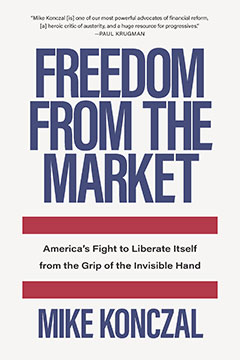“Freedom from the Market: America’s Fight to Liberate Itself from the Grip of the Invisible Hand”
By Mike Konczal
Some of the most heated political debates in the U.S. — around healthcare coverage, student loan debt, child care, work-life balance and access to home ownership — can be traced back to the question of whether or not we should allow the free market to determine how we live.
In “Freedom from the Market,” author Mike Konczal, a director at the progressive economic think tank the Roosevelt Institute, says no. He argues that modern capitalism, in which devotion to the free market has become an undisputed article of faith, has, ironically, eroded Americans’ freedom by forcing individuals to become reliant on the market. A truly free people would have access to the basic services they need to survive, regardless of their purchasing power, and to create those circumstances we must be freed from the market economy that current selects winners and losers — with literal life and death consequences. The book offers a history of how people in the U.S. have fought against market dependency, and lays out five broad, overlapping arguments that have evolved over time for why curtailing the power of the market is necessary to achieve freedom for the people who live in its shadow.
The distribution of goods and services in a market economy doesn’t match what we need to live free lives. What does it mean to be free? Konczal would say that the definition includes equal access to necessities such as healthcare and education. In the current system that distributes these goods solely on the basis of who can afford to pay for them, we cannot call ourselves free.
The market is an unreliable provider of these essential goods. Private companies simply do not produce enough goods and services to meet society’s needs — and they have no incentive to change that. Because the influence of the market is all powerful, private universities focus their efforts on growing their prestige and endowments instead of improving access to education. Insurance companies preemptively discriminate against those who would benefit the most from coverage. The government can and has subsidized private businesses to get them to provide these essential goods, but in the absence of such oversight and regulation, these entities capture the resources for their own enrichment rather than providing what the public needs.
Freedom requires being free from arbitrary power and domination by the will of others. Konczal echoes other theorists who have argued that if others are able to suddenly and deliberately interfere with your life, you are not free. The market economy has proven to dominate the lives of people of every economic class, as evidenced by the labor contract. Workers sell their labor and bosses buy it, and while workers have the choice to leave their jobs, many do not because, thanks to market dependency, workers must work in order to obtain food, shelter, medicine and other basics of survival. The market interferes with their lives in ways they have no control over.
The expansion of markets to all of society turns all things into commodities, devaluing anything that does not function as a commodity. Things such as land, labor, money and time are not actual commodities; instead, they are “fictitious commodities.” Labor is just another name for human activity that is tied to life itself. Land is not produced by anyone; it existed before the advent of the market. Some aspects of life need to function outside a system of commodities.
The marketplace is a political project, a form of government that projects state power. Konczal finds that there is no neutral way to have a market — the execution of the marketplace by the government is political and is always debated. Therefore, the concept that a market can ever be “free” or objective — and therefore somehow above the need for oversight — is faulty. The market simply reflects the values of the people with enough power to influence it.
A free society, Konczal argues, ensures that its people have access to key goods, and suppresses the market where necessary in order to make that happen. He believes this can be done through regulations and mandates at times, but also sometimes through the public finding ways to directly provide the good itself, outside of the market. A free society gives workers a say in the workplace that goes beyond allowing them to quit jobs (since, in practice, market dependency makes this “freedom” illusory): The government must check abuses by shareholders and compensate crucial work done outside of the marketplace, such as providing child care.
The freer world Konczal imagines seems awfully far from our current reality, but the paradigm-shifting discussion he launches in “Freedom from the Market” makes it clear that the future of our economy can, and perhaps should, look different than it does today.

